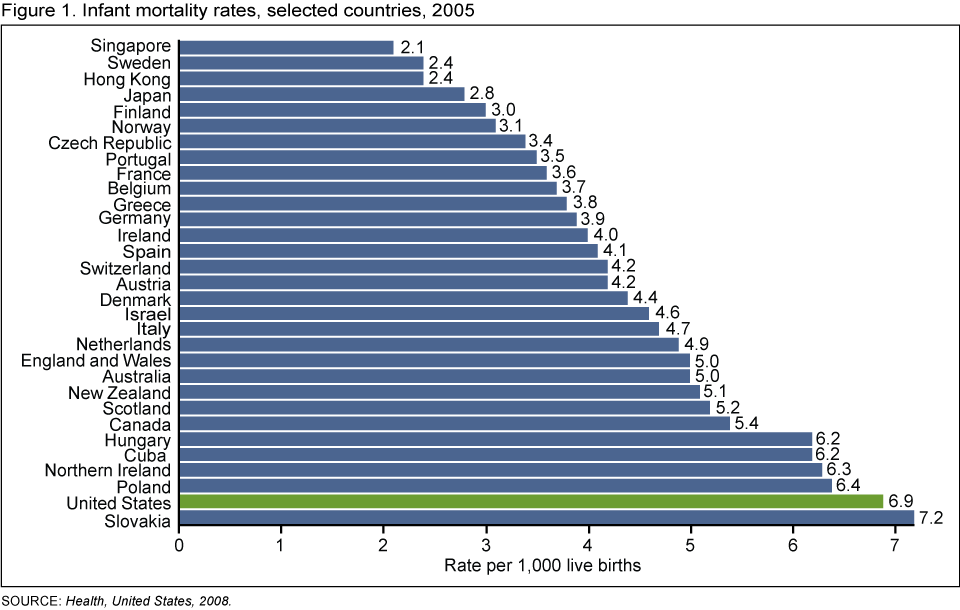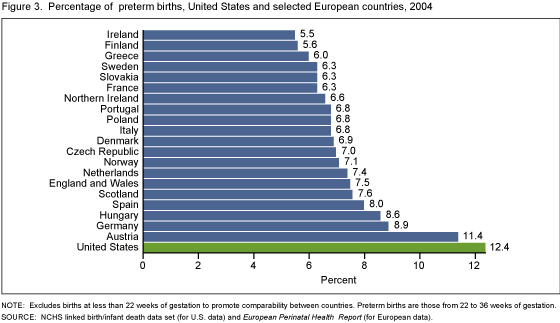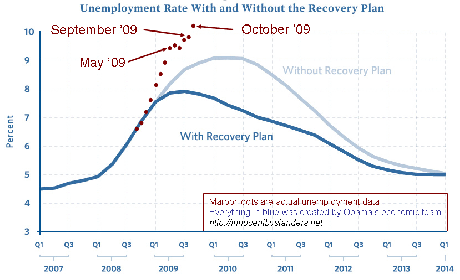The race is on. Health Care reform’s time has come-or gone. Whatever side you come down on, the debate is intense. And so it has been with friends and colleagues of mine. One one side you have those that claim the United States spends more money per year on health care and has one of the worst systems in the industrial world. On the other side you have the opposite. These people admit that while we may spend more than any other nation on health care this claim would be equally true of expenditures on blue jeans, pro sporting tickets, aquariums, X-boxes and lawn mowers. Further, rather than being one of the worst providers of medical care, these folks would argue that the Unites States delivers the best care in the world.
Who is right? Let’s go to the data. I am going to focus on the infant mortality rate – IMR. Those who champion universal health care claim that the United States ranks 30th in the world in IMR. A quick check shows that indeed, we do:

Further, they claim that infant mortality rate is an indicator of health care services in a country. For this to be true, three conditions must be met:
- All nations are reporting their numbers correctly/consistently.
- The infants that are dying are of the same type.
- Factors other than medical services are being accounted for.
Consistency in Reporting
We know for a fact that not all nations count the infant mortality rate the same. In the United States, we use the WHO definition:
Live birth refers to the complete expulsion or extraction from its mother of a product of conception, irrespective of the duration of the pregnancy, which, after such separation, breathes or shows any other evidence of life – e.g. beating of the heart, pulsation of the umbilical cord or definite movement of voluntary muscles – whether or not the umbilical cord has been cut or the placenta is attached. Each product of such a birth is considered live born.
In Europe, for example, they use a different definition: [see page 122]
The infant mortality rate is defined as the number of infant deaths (days 0-364) after live birth at or
after 22 completed weeks of gestation in a given year, expressed per 1000 live births in the same
year.
And yet, even this definition is not standard across the European Countries: [see page 122]
Almost all countries provided data on overall infant mortality rates. However, many fewer were able to provide data on infant mortality rates by gestational age or birth weight, since infant deaths are registered in separate systems and not linked to perinatal data. These data were available for gestational age only from Flanders and Brussels in Belgium, Denmark, Estonia, Latvia, Malta, Austria, Poland, Finland, Sweden, the UK, and Norway.
This means, of course, that for countries like Portugal, France, Belgium, Greece, Germany, Spain, Switzerland, Austria, Italy and the Netherlands the method for counting don’t abide to even the less restrictive definition that the rest of the EU uses. And all of these countries rank higher than the United Sates in the ranking by the CDC. Further, the United States actually OVER reports the live births and subsequent deaths.
What happens when adjustments are made for these differences?
Norway boasts one of the lowest infant mortality rates in the world. But when the main determinant of mortality — weight at birth — is factored in, Norway has no better survival rates than the United States.
Which Infants Are Dying
The reason for the death is important in measuring IMR as well. If, for example, there is an indicator that results in a much larger IMR than another, and that indicator is present in one population but not another, that would explain a difference in the two IMR rankings. One of the first things that we should look at in determining if these IMR rankings are accurate is to identify if such in indicator exists. And it does:
In 2004, the U.S. infant mortality rate (excluding births at less than 22 weeks of gestation) was 5.8, nearly twice the rate of 3.0 for Sweden, one of the two European countries with the lowest infant mortality rate (along with Norway).
Using direct standardization (10), we applied the U.S. gestational-age specific infant mortality rates to Sweden’s distribution of births by gestational age. If the United States had Sweden’s distribution of births by gestational age, the U.S. infant mortality rate (excluding births at less than 22 weeks of gestation) would go from 5.8 to 3.9 infant deaths per 1,000 live births—a decline of 33%.

In fact, if we use the numbers above, and just the numbers above, the US moves from its current ranking of 30th to a ranking of 12; tied with Germany. And this does not even include the adjustments that certainly would move many of those countries 1-11 even lower.
And how does the US rank in Preterm Birth Percentage?

We rank among the highest in the world. The ranking that WHO and the CDC and the CIA report are now, perhaps, showing a different story. They may not be showing a picture of the medical delivery service in America for infants, rather, they may be showing that America delivers far more Preterm babies than the rest of the world. Or, or, that we REPORT more preterm live births than the rest of the world. If even one of these two statistics were reported, the US would jump either near the very top or would move up 18 spots on the list.
Non-medical Factors
Lastly, when looking at the IMR as an indicator on the medical delivery, or health care, system, it is equally important to look into factors that contribute to IMR that have nothing to do with that system. And again, we see that there are such factors:

It jumps out of the page; black babies dies at a higher rate than any other followed by Hawaiian and Native American. And why the discrepancy in black women?
the largest difference in rates between the two groups was for preterm birth/low birthweight infants— infants born to Black women had an infant death rate due to preterm birth/low birthweight four times higher than those born to White women.

And why are we seeing black women delivering babies with such low birthrates? Two possible reasons:
One reason African-American mothers have babies who weigh less at birth is that they are at greater risk for such conditions as high blood pressure and preeclampsia.
And the other:
Also, minority women are subject to stress caused by perceived racial discrimination, the researchers said.
David and Collins spoke with black women who had babies with normal weights at birth, comparing them with black women whose babies’ birth weight was very low — under three pounds.
They asked the mothers if they had ever been treated unfairly because of their race when looking for a job, in an educational setting or in other situations.
Those who felt discriminated against had a twofold increase in low birth weights. And for those who experienced discrimination in three “domains,” the increase was nearly threefold.
In David and Collins’ study of black women who gave birth in two Chicago hospitals, 16 percent said their partner was in jail during the pregnancy.
“We interpreted this finding as another indicator of stress, but one caused by institutional rather than interpersonal racial discrimination,” David said.
Net/net, the United States has work to do. We have whole groups of people who need to be served. There are improvements that can be made. But the raw statistic showing that the United States has such a low IMR is simply not accurate. And where it is accurate, it can be explained in large part, to conditions that may have nothing to do with medical service delivery.
In fact, the US has reason to shout out to our medical system:
Since 2000, 42 of the world’s 52 surviving babies weighing less than 400g (0.9 lbs.) were born in the United States.










